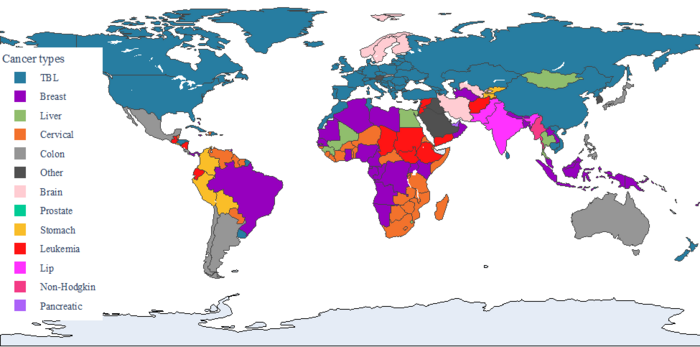A new study calculated the economic cost of cancers around the world, helping policymakers allocate resources appropriately and enact policies to curb the increase in cancer-related death and disability.

Credit: Chen et al. (2023)
A new study calculated the economic cost of cancers around the world, helping policymakers allocate resources appropriately and enact policies to curb the increase in cancer-related death and disability.
Cancer is the leading cause of death worldwide, claiming the lives of nearly 10 million people every year. The incidence of the disease is on the rise due to population aging, smoking, alcohol consumption, unhealthy diets, sedentary lifestyles, and air pollution. Cancer not only harms human lives but also the economy – it inflicts a huge financial burden on countries through reduced productivity, labor losses, and investment reductions.
The health and economic burdens of cancers are recognized as an urgent matter, as demonstrated by President Biden’s reignition of the Cancer Moonshot initiative, the World Health Organization’s Global Action Plan for the Prevalence and Control of Noncommunicable Diseases, and the United Nations Sustainable Development Goals target 3.4 – reduce pre-mature mortality from non-communicable diseases by one-third through prevention and treatment by 2030. Despite this urgency, the global economic cost of cancers has not yet been comprehensively investigated.
To address this gap and help policymakers curb the increase in cancer-related death and disability, an international team of researchers set out to estimate the economic cost of 29 cancers in 204 countries and territories, covering most countries in the world. The study, published in the Journal of the American Medical Association (JAMA) – Oncology, used a comprehensive modeling framework estimating the macroeconomic cost of cancer in terms of lost GDP.
“Many of the current economic studies on cancer are static, missing out on the future consequences of current loss in labor and treatment costs,” says IIASA Economic Frontiers Program Director Michael Kuhn, who was a coauthor of the study. “Our work is pioneering in the sense that it estimates the macroeconomic cost of cancer using a model that embraces many of the economic adjustment mechanisms, incorporating changes in labor supply due to cancer mortality and morbidity, as well as the loss in capital investments related to treatment costs.”
The study estimated the global economic cost of cancers from 2020–2050 to fall around $25.2 trillion in international dollars (INT$, at constant 2017 prices), which is equivalent to an annual tax of 0.55% on global gross domestic product. The researchers also identified the type of cancers that incurred the highest economic burden with lung cancer leading the way followed by colon and rectum cancer, breast cancer, liver cancer, and leukemia.
The findings further indicate that the health and economic costs of cancers are distributed unevenly across countries, and regions. China and the United States face the largest economic costs of cancers in absolute terms, accounting for 24.1% and 20.8% of the total global burden, respectively. While the majority of cancer deaths occur in low- and middle-income countries, their share of the economic cost of cancers is only about half.
“The four economically most damaging cancers are all amenable to primary and secondary preventions, such as smoking, diet, and alcohol interventions and increased screening,” notes Kuhn. “This reveals the large potential for policy interventions world-wide, which will help to curb the trade-off between the high disease burden and the high economic burden.”
The authors stress that investing in effective public health interventions to reduce the burden of cancers is essential for protecting global health and economic wellbeing.
Reference
Chen, S., Cao, Z., Prettner, K., Kuhn, M., Yang, J., Jiao, L., Wang, Z., Li, W., Geldsetzer, P., Bärnighausen, T., Bloom, D.E, Wang, C. (2022). The global economic cost of 29 cancers from 2020 to 2050: Estimates and projections for 204 countries and territories. Journal of the American Medical Association (JAMA) – Oncology DOI: 10.1001/jamaoncol.2022.7826
About IIASA:
The International Institute for Applied Systems Analysis (IIASA) is an international scientific institute that conducts research into the critical issues of global environmental, economic, technological, and social change that we face in the twenty-first century. Our findings provide valuable options to policymakers to shape the future of our changing world. IIASA is independent and funded by prestigious research funding agencies in Africa, the Americas, Asia, and Europe. www.iiasa.ac.at
Journal
Journal of the American Medical Association
DOI
10.1001/jamaoncol.2022.7826
Article Title
The global economic cost of 29 cancers from 2020 to 2050: Estimates and projections for 204 countries and territories
Article Publication Date
23-Feb-2023




